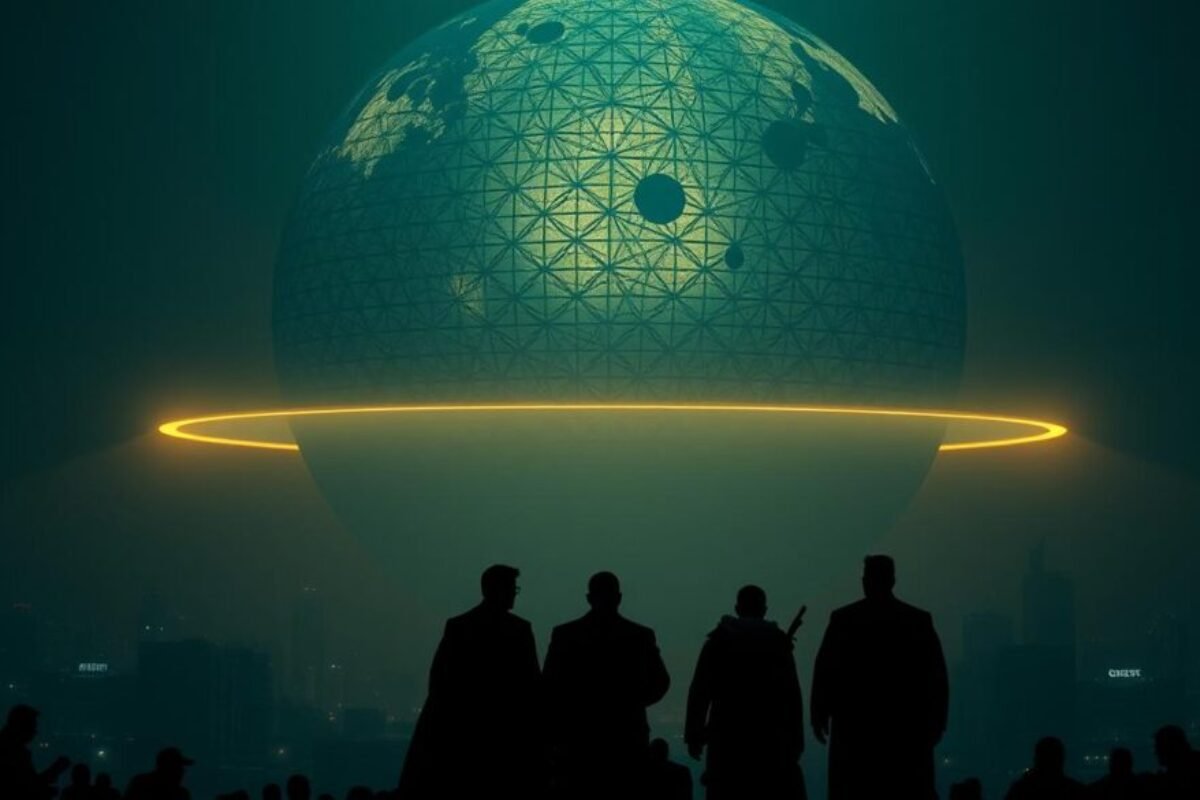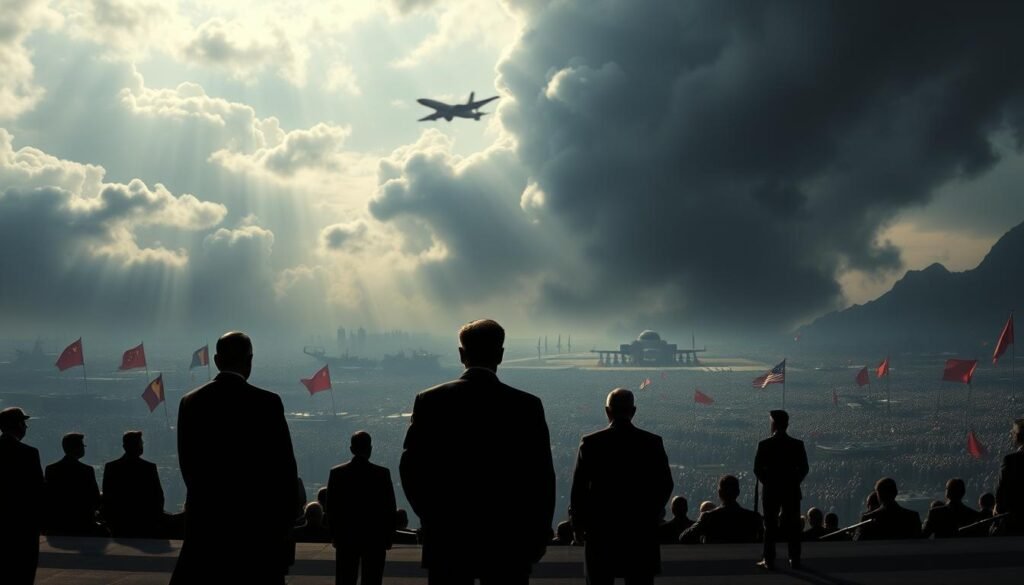The New Global Power Dynamics: What’s Changing?
In 1945, the United States had almost half of the world’s wealth. Now, it’s nearly 24%. This shows a big change in global power.
After World War II, the US helped create rules-based institutions. But conflicts in the Middle East and Eastern Europe have made people doubt these organizations. This has led to a shift in global power.
Key Takeaways
- Global leadership has shifted due to changing economic balances.
- Post-war organizations face fresh doubts about their relevance.
- Rising powers challenge legacy systems that shaped past alliances.
- Regional unrest highlights a turn toward diverse power centres.
- We enter an era of cooperation and rivalry on many fronts.
Why the Post-WWII Order Is Unravelling
New tensions are eroding trust in global governance. Western powers, who once led, now ignore international institutions when they don’t agree with their interests. This approach erodes confidence in the frameworks built decades ago.
The post-World War II order is unravelling as these structures lose respect from their supporters.
- Military moves without clear international support weaken collective security
- Sanctions spark doubts about impartial trade rules
- Rising economies call for equal influence, challenging established hierarchies
These clashes show a deeper shift in power assertion. Non-Western nations are now engaging global institutions on their terms. At the same time, Western states question the same bodies they once supported.
The unravelling of the post-World War II order marks a turning point. It may reshape international collaboration and bring new geopolitical realities.
Case Study: International Relations in a Multipolar World

The world is changing fast, with power groups, realignments, and competition rising. After the Cold War, divisions and solo actions hurt global unity. This makes us rethink how we handle international relations.
Historical Antecedents in World Politics
Looking back, we see how big ideas shaped whole generations. Economic and military rivalries led to the formation of blocs. These blocs have shaped today’s world.
Geopolitical Trends Shaping Our Analysis
Now, money, resources, and public feelings drive countries’ actions. Regional groups are becoming key players. These changes make us rethink alliances.
Lessons from the Field
States are using diplomacy and specific deals to gain power. This shows a fine balance. It’s key to be flexible and aim for lasting solutions in international relations.
| Era | Key Shifts |
|---|---|
| Cold War | Rigid blocs and bipartite alliances |
| Post-Cold War | Fragmented institutions and regional coalitions |
| 21st Century | Multipolar dynamics and shared global responsibilities |
Identifying The New Global Power Dynamics
New forces are changing how countries interact. Some nations grow strong by controlling resources and teaming up with like-minded partners. In the past, actions by one country hurt trust worldwide. This opened the door for new powers to rise.
These new players have made big strides in the economy and technology. This has lifted countries that were once seen as small players.
Main Factors Driving Global Power Shifts
There are ongoing changes as new groups challenge old ways. Today, money and technology are as important as military might. Partnerships based on trade and innovation are growing. These alliances help countries avoid relying too much on old systems.
The Role of Strategic Foreign Policy
We look at a mix of soft power and diplomacy. A smart foreign policy can make a country more respected and influential. Building alliances makes countries stronger together, helping shape a new world order.
| Factor | Short Explanation |
|————————–|———————————————————–|
| Resource Leverage | States use commodities or technology for political gain |
| Innovative Diplomacy | Creative alliances enhance mutual standing and influence |
| Balanced Power Approaches| Soft power complements military and economic strategies |
Regional Perspectives on Global Governance
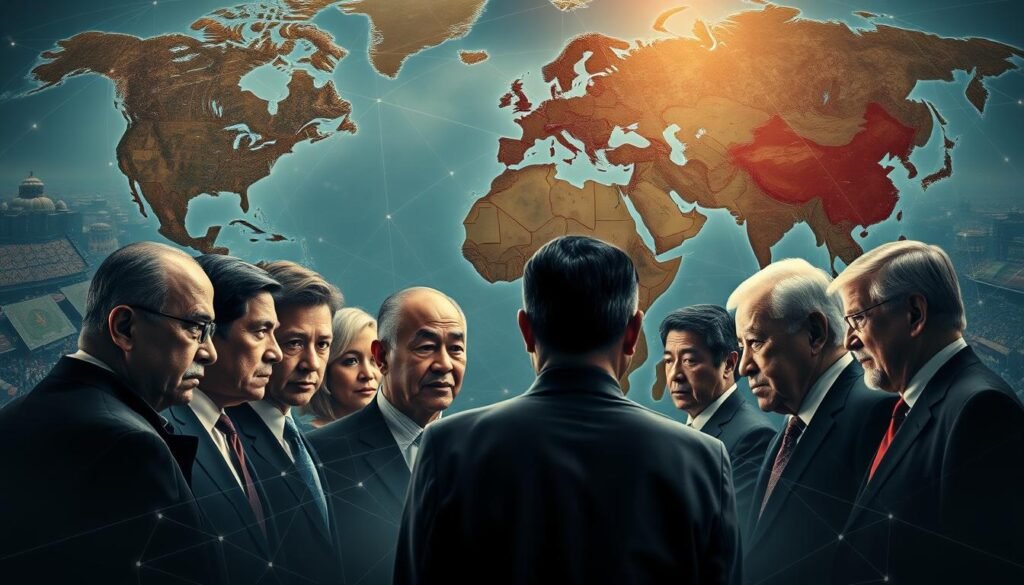
Each continent has its way of looking at global governance. Europe likes working together through groups like the European Union. Asia focuses on economic partnerships that help balance power.
In Africa, leaders want more say in the United Nations. They want their growing economies to be recognized. Latin America wants deals that are fair and flexible. The Middle East puts stability first, trying to keep peace at home and abroad.
We dream of a future where all these views come together. A new United Nations, open to all, could be the key. We aim to respect each region’s needs while keeping global rules fair and stable for everyone.
Strategies for Navigating the Changing Geopolitical Landscape
We see a need for proactive steps to handle power shifts in the world. Trade issues and security problems are rising, moving from the north to the south. We need flexible plans to keep peace and prosperity.
A balanced strategy includes open talks, working together, and smart use of resources. These steps involve:
- Open diplomatic frameworks
- Secure trade and investment relationships
- Enhanced defence readiness
Establishing Diplomatic Channels
Diplomatic ties are key. We should strengthen ties with groups like the United Nations. This helps build respect and lowers misunderstandings when tensions rise.
Building Economic Alliances
Strong alliances come from varied trade paths and shared projects. We should partner with big markets in North America or Europe. Yet, we also need to look at new areas. A solid economic plan helps keep the world stable.
Adapting Security Policies
Today’s threats need new security plans. We should improve our defence by adding cybersecurity, sharing intelligence, and solving conflicts fast. This makes us ready for what’s next.
Our Role in Shaping International Diplomacy
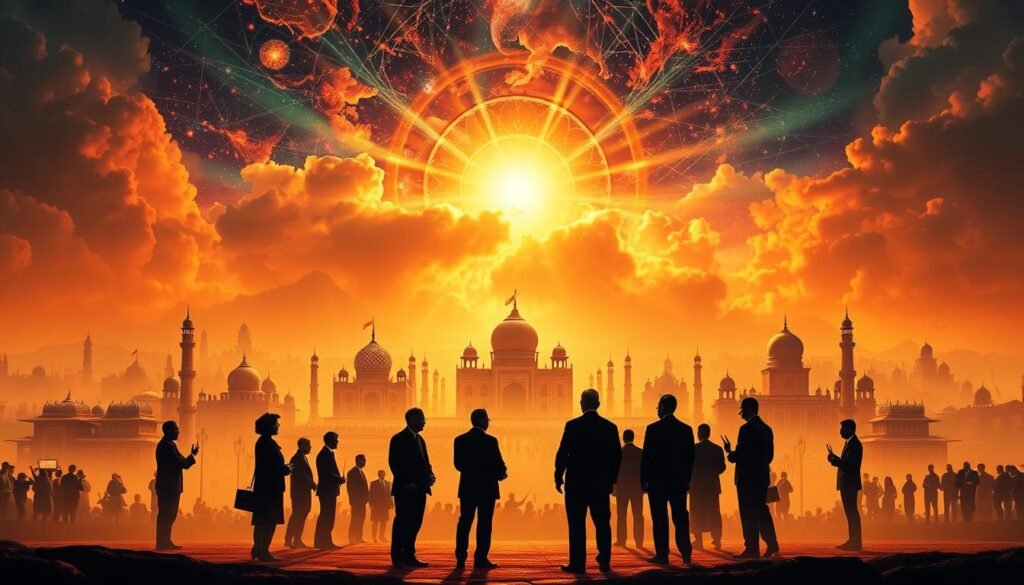
We see that the world is changing, and countries need to work together more than ever. By teaming up with groups like the United Nations and the G20, we can achieve more. Everyone brings their ideas, connections, and help to make diplomacy fair for all.
It’s important to share values so that even smaller countries can have a say in big decisions.
We aim to lead talks on big topics like climate change and helping those in need. This shows that old ways of power don’t work anymore. We think everyone should work together, taking into account different cultures and economies.
- Advocate transparent negotiations among major alliances
- Encourage emerging economies to participate in governance
- Coordinate shared responsibility for global security
| Diplomatic Action | Potential Outcome |
|---|---|
| Joint Climate Initiatives | Reduced environmental hazards |
| Regional Economic Pacts | Balanced trade opportunities |
| Technology Exchange Programs | Equitable digital transformations |
Examining the Rise of the Global South
We see big changes in developing countries. Populations in Africa, South Asia, and Latin America are growing fast. They have lots of resources and are using technology to grow stronger.
These changes are making the “global south” more important in world affairs. They are changing how we interact globally.
Africa is key in getting resources for the world. China is teaming up with other countries, showing a new way of working together. This is changing how we do business and build things.
Economic Drivers in Emerging Regions
Energy, farming, and digital hubs are driving growth. Local businesses are working with investors to make things and come up with new ideas. Trade routes are helping to move goods and money, helping places grow.
Political Influence of the Global South
Groups are using their votes to push for change in big organizations. They are forming new alliances to make sure everyone has a say. Leaders from these countries are fighting for fair deals on resources.
New Multipolar World: Beyond Traditional Power Blocs
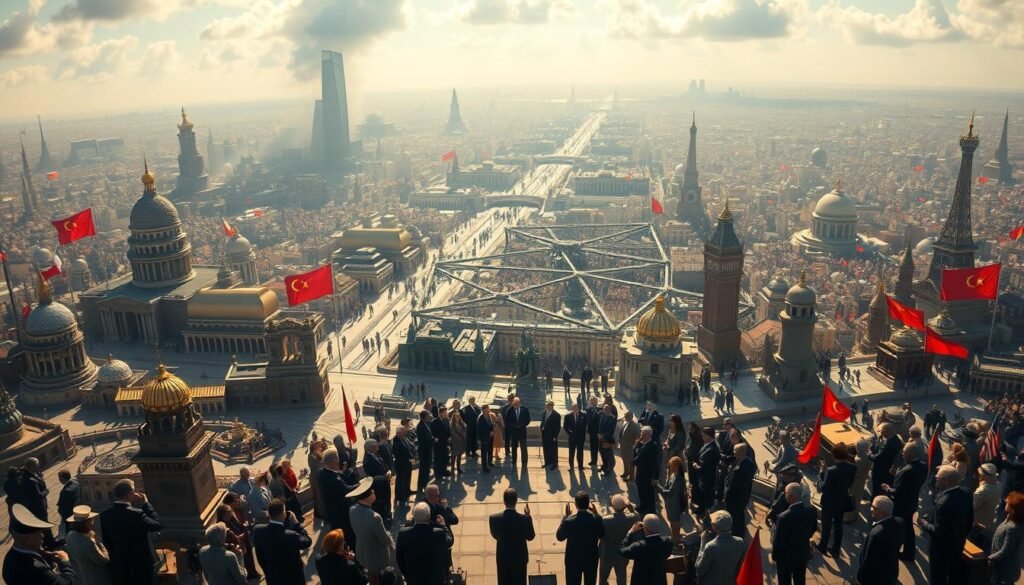
We see a shift towards shared power among many regional powers. States once overshadowed by dominant blocs now influence global norms. They bring fresh ideas and form agile partnerships.
These actions show a growing focus on cooperation based on practical interests. This is different from the old days of rigid ideological lines.
Alliances are now more flexible and change quickly when national goals align. The growth of BRICS is a good example. It shows a trend towards economic strength outside traditional circles.
We also see more local pacts forming. These pacts strengthen security and share resources.
But, there are risks in this new world order. Disputes can get more complicated. Solving them needs open communication.
Yet, there are also chances for nations to work together. Voices from Asia, Africa, and Latin America are becoming louder. They remind us that balance can lead to new solutions for global problems.
Comparative Case Studies: Examples of Global Power Shifts
We see a shifting reality across key regions. Our focus highlights how expanded trade and partnerships reshape the global landscape.
Case Study: Asia’s Growing Influence
Asia is growing fast, led by China’s manufacturing growth. This growth includes new tech investments in digital infrastructure. Partnerships like RCEP boost regional power, showing ongoing geopolitical trends.
Case Study: African Regional Alliances
Africa is becoming more united and strategic. The African Union supports sharing resources, building stronger alliances. This helps African nations compete globally, shaping new power balances.
We see these efforts connect with current geopolitical trends. They spark a wave of new collaborations.
Security Challenges in an Uncertain World
We live in a world filled with ongoing conflicts in Ukraine and Gaza. Proxy battles are getting more intense, and the threat of nuclear weapons is real. Cyber attacks on our financial systems and government networks make things even more serious.
These issues don’t just stop at direct fights. Climate change and food shortages can make things worse. The rise of new global powers adds to the complexity of managing shared resources. We see that old alliances might not be enough to solve deep problems.
We think we can tackle these risks by working together. Projects based on trust and openness might lead to lasting peace. Our dream is a world where stopping conflicts is our top priority.
Policy Recommendations for Strategic Foreign Policy
We see the need for broad alliances in the complex world of politics. Relying only on oneself often leads to failure. Our strategy is to build trust, listen to smaller states, and keep communication open.
This approach values the importance of working together. It shows the weakness of going alone and the strength of inclusive strategies.
Collaborative Approaches
We recommend regular talks among key players, with everyone’s voice heard. Diplomatic forums are stronger when all agree to fair mediation and clear conflict resolution. Big and small powers can learn from each other, avoiding blind spots and building mutual support.
Long-Term Outlook
We suggest managing resources wisely, balancing trade, and investing in people. Our foreign policy should adjust to economic and regional changes. We aim for stable partnerships by keeping treaties, even when politics at home change.
This approach creates consistency and promotes lasting progress in world politics.
Impact on the United States’ Global Standing
Changes in how Europeans view America are affecting our global image. Conflicts like Ukraine are making us rethink our approach. We must adjust our strategies to stay relevant.
Our role is critical, but we’re hearing more about the need for balance. There’s a push for stronger partnerships and more equal engagement.
At home, we’re facing challenges from populist movements. These tests our unity. We need to act with transparency and shared goals.
True international diplomacy is key. It builds trust and strengthens our alliances in a world with many powers.
“We believe global challenges demand collective action,” said President Joe Biden.
To keep our influence, we must work with our allies. Supporting global institutions is also important. This way, we ensure our voice is heard everywhere.
| Key Shifts | Implications | Proposed Responses |
|---|---|---|
| Power Distribution | Diverse alliances form | Engage in open dialogue |
| Domestic Pressures | Calls for reform | Maintain accountable leadership |
| Global Partnerships | Shared security goals | Invest in international diplomacy |
Evaluating the Future of International Relations
We are on the edge of a new era in global relations. This era could change how countries work together and compete. The years 2024 and 2025 are key for Western alliances and the rise of new powers.
Technology, resource use, and economic policies will likely change. BRICS might grow stronger, and new alliances could change the power balance. Countries may face challenges over AI, climate issues, and key minerals.
Potential Alliances and Conflicts
We predict stronger bonds among growing economies for security and trade. But regional conflicts could flare up if global bodies can’t solve big issues.
Key Indicators to Watch
Several signs will show us where international relations are headed:
- Changes in trade deals and investments
- Public views on national freedom and global rules
- Speed of nuclear updates
- Shifting money flows that change economic hubs
Our Perspective on World Politics
We see the West’s breakdown as a chance to rethink alliances. This change shakes up old ways but opens doors to new cooperation. We aim to boost talks across the globe, focusing on peace and fairness.
A world with many powers is a chance to make new connections. When different voices meet, new ideas come, but challenges grow too. We believe in using creativity to solve problems, aiming for fair solutions that respect all nations.
We push for leaders who can lead through tough times, respecting different cultures. Our experience shows that careful planning builds stability worldwide. By building strong, trusting partnerships, we hope to reduce global conflicts. We’re hopeful that working together with respect will lead to a more peaceful world.
Conclusion
We are at a critical point where alliances and economic plans need careful thought. Recent studies highlight 2024 and beyond as key for rethinking partnerships between nations.
The world is changing, with new powers and old ones vying for influence. It’s essential to have clear rules for working together. This way, we can respect different views and goals. Our experiences show that talking openly and making balanced decisions can lead to peaceful cooperation.
A Call for Collective Effort
It’s important to understand the new global power balance to plan wisely and reduce conflicts. Our future depends on fair and cooperative actions that benefit all. With respect among key players, we can create a stable world that meets everyone’s hopes.
